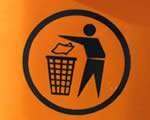 Go to main content
Go to main content
Archive Website of the UK government
Please note that this website has a UK government accesskeys system.
Main menu
Page menu
Environment and greener living

Electrical equipment: reuse and disposal

Every year, people in Britain throw away nearly half a million tonnes of electrical items. Save money and energy by keeping items like computers and mobiles for longer. Help stop harmful chemicals getting into the environment by recycling electrical items, rather than putting them with household rubbish.
Keep equipment for longer

Most mobile phones will work for at least five years
Making electrical items uses a lot of energy and valuable materials, including precious metals like gold and silver. Electrical equipment can also contain chemicals like lead and mercury. These chemicals can get into the environment and harm people or animals if items are not disposed of carefully. You can save money and cut waste by holding onto your equipment for longer, so try the following tips.
Upgrade computers
If your computer is getting a bit old, you could:
- think about improving it rather than buying a new one, by increasing memory (RAM) or replacing the hard drive
- ask in a computer shop or search online to get advice, parts and technical help for upgrading
- keep your existing monitor if you do get a new computer
Keep mobile phones for longer
There's no need to replace your mobile phone every year; most will work for at least five years. Hanging on to your current phone can save you money, as the cost of a new handset is usually included in monthly tariffs. Ask your phone company about the different tariffs they have available if you don’t upgrade your handset ('SIM only').
Reuse equipment

Electrical items, including cables and plugs, can often be reused
Unwanted electrical items, including cables and plugs, can often be reused. In fact, over half of electronic items that are thrown away are still working or could easily be repaired. Try finding a new home for unwanted electrical items.
Give to individuals
Organisations like Freecycle and Freegle can help you find someone who wants your old equipment.
Give to a charity
Your local charity shop may accept electrical goods, but ask before donating them. Other ways of finding places that accept electrical donations are:
- looking on your council’s website, which may list local charities that accept electrical items
- using the Furniture Reuse Network’s online map, which shows you your nearest reuse charity (many will take electrical goods)
You can donate power tools to charities that send them to developing countries, like 'Tools with a mission' or 'Tools for self reliance'.
Reusing computers
If your computer equipment is in good working order, you may be able to sell it. Try advertising online, in a local paper or on local notice boards.
You could also give away your old computer or other items like printers, mice, power cables and keyboards. Try using the links below to find a new home for your PC.
Before you pass on your computer or recycle it, make sure you fully remove any information that you don’t want anyone else to see. Simply deleting the information is not enough. Use the link below to find out how to do this.
Recycle electrical goods

This symbol means you shouldn't dispose of the item with normal household waste
If you have to dispose of old electrical equipment, make sure it is recycled safely. This will help save energy and stop harmful chemicals damaging the environment. The ‘crossed out wheelie bin’ symbol found on many electrical items means that they should not be put with normal household rubbish.
When buying new electrical items
When you buy a new electrical item, ask the shop where you buy it how they will help you recycle the item you're replacing. Under the Waste Electronic and Electrical Equipment (WEEE) Regulations, they must either:
- accept in-store, free of charge an electronic item equivalent to the new item you're buying
- tell you where you can take the old item for recycling free of charge
Some shops also offer a ‘collection on delivery’ service and will take away your old electrical items when delivering new items. This isn't part of the WEEE Regulations, so you may be charged for this service.
Household waste recycling centres

Find locations and opening times for recycling centres near you
Other recycling options
You can also dispose of electrical waste by:
- taking it to your local household waste recycling centre (civic amenity site) where it will be recycled safely and free of charge
- arranging for your local authority to collect large items from your home (you can be charged for this service)
The links below will let you enter details of where you live and then direct you to local services and information.
Recycle batteries
Many electrical items, like laptops and mobile phones, have batteries which can be recycled.
Most supermarkets and shops that sell batteries will have collection bins for used batteries. Some local councils collect batteries with doorstep recycling, or provide bins at local waste and recycling centres. The link below will show you if there is a battery recycling point near you.
Energy saving light bulbs
Energy saving light bulbs need to be disposed of carefully, as they contain mercury. For information on how to recycle them safely, see 'Energy saving light bulbs'.
 Facebook
Facebook Twitter
Twitter StumbleUpon
StumbleUpon Delicious
Delicious Reddit
Reddit
